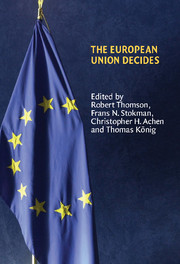Book contents
- Frontmatter
- Contents
- List of figures
- List of tables
- Notes on contributors
- Preface
- 1 Explaining legislative decision-making in the European Union
- 2 Research design: measuring actors' positions, saliences and capabilities
- 3 Testing procedural models of EU legislative decision-making
- 4 Institutional realism and bargaining models
- 5 Compromise, exchange and challenge in the European Union
- 6 Nash versus Schelling? The importance of constraints in legislative bargaining
- 7 A cooperative approach to decision-making in the European Union
- 8 A procedural exchange model of EU legislative politics
- 9 Beyond informal compromise: testing conditional formal procedures of EU decision-making
- 10 Evaluating political decision-making models
- 11 Evidence with insight: what models contribute to EU research
- Appendix I Selection of Commission proposals
- Appendix II Comparison of expert judgements with each other and with information from Council documentation
- References
- Index
- Title in this series
6 - Nash versus Schelling? The importance of constraints in legislative bargaining
Published online by Cambridge University Press: 22 September 2009
- Frontmatter
- Contents
- List of figures
- List of tables
- Notes on contributors
- Preface
- 1 Explaining legislative decision-making in the European Union
- 2 Research design: measuring actors' positions, saliences and capabilities
- 3 Testing procedural models of EU legislative decision-making
- 4 Institutional realism and bargaining models
- 5 Compromise, exchange and challenge in the European Union
- 6 Nash versus Schelling? The importance of constraints in legislative bargaining
- 7 A cooperative approach to decision-making in the European Union
- 8 A procedural exchange model of EU legislative politics
- 9 Beyond informal compromise: testing conditional formal procedures of EU decision-making
- 10 Evaluating political decision-making models
- 11 Evidence with insight: what models contribute to EU research
- Appendix I Selection of Commission proposals
- Appendix II Comparison of expert judgements with each other and with information from Council documentation
- References
- Index
- Title in this series
Summary
INTRODUCTION
When the Council of Ministers had to decide on the so-called chocolate directive in 1999, its plan to allow vegetable fat in the production of candy products met with fierce opposition from Belgium, France, and the Netherlands. These three member states objected to the usage of vegetable fats other than cocoa in chocolate. Although they advanced some consumer-friendly arguments, continental manufacturers also tried to avoid competition from the British chocolate industry and to protect some of their traditional trading partners in the African, Caribbean and Pacific (ACP) countries. They particularly protested against the proposed derogations that would have allowed the United Kingdom and Ireland to continue the production of ‘household milk chocolate’, which contains a large amount of milk. While the Belgian government spoke of ‘à la carte harmonisation’ benefiting ‘the industries of only certain member states’ (Europe Daily Bulletins, No. 7583, 29 October 1999), French chocolate makers demonstrated against the measure during the plenary session of the European Parliament in January 2000. The massive lobbying by the Belgian and French interest groups was, however, only partially successful. The European Parliament accepted the common position of the Council, allowing some sorts of vegetable fats in chocolate as well as the derogations favouring British and Irish ‘family milk chocolate’. The legislature nevertheless added a ‘fair trade’ requirement. This successful amendment granted the industry the right to sell chocolate containing up to six sorts of vegetable fat everywhere in the European Union, as long as these ingredients came from developing countries (Europe Daily Bulletins, No. 7677, 16 March 2000).
- Type
- Chapter
- Information
- The European Union Decides , pp. 153 - 177Publisher: Cambridge University PressPrint publication year: 2006
- 37
- Cited by



